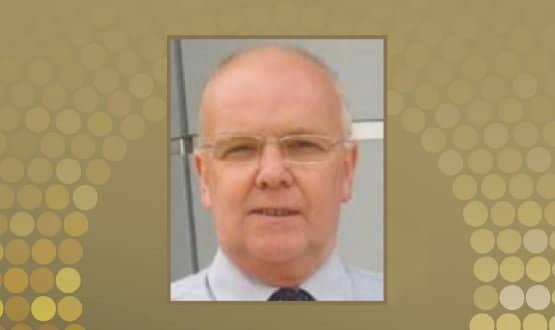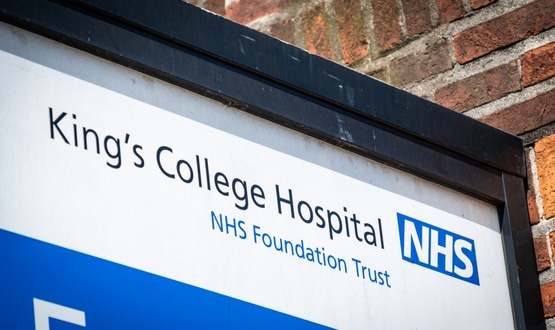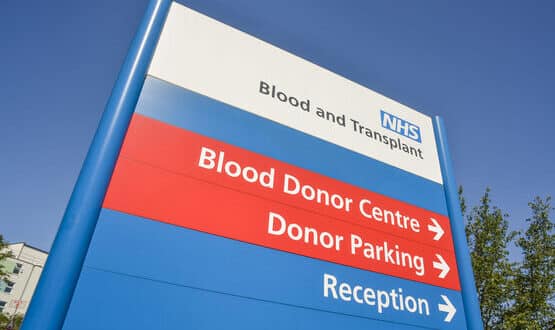Commemorating: Professor Rick Jones
- 20 November 2014

Passionate, enthusiastic, knowledgeable, energetic. Those are just some of the words that those who knew Professor Rick Jones use to describe his personality and the skill-set he brought to healthcare IT.
Professor Jones, who died on 1 July this year aged 61, was named Healthcare IT Champion of the Year at this year’s EHI Awards.
Sadly, he died just before voting started. But his friends and family asked for his name to go forward; and the accolade is a fitting epitaph to a lifetime spent working to change health informatics and pathology systems across the UK.
His wife, Vivien, who accepted the award with their son Luke, says the standing ovation they received at the EHI Awards presentation dinner was a powerful demonstration of the impact that he had on people’s lives.
“It was wonderful to realise just how much respect and affection he inspired in his colleagues around the country,” she says.
Tested by pathology
Born in Manchester in 1952, Professor Jones won a place at Oxford’s Corpus Christi College to study medicine, where he met his wife before qualifying in 1978.
He spent the first five years of his medical career in Oxford, joining the Royal College of Physicians in 1980 and undertaking research as a Medical Research Council training fellow at the Nuffield Department of Medicine.
He then moved to Leeds in 1983, to work as a tutor in medicine at the University of Leeds. It was in Leeds that he developed a strong interest in and experience of two areas that would become defining aspects of his career.
In 1985, he transferred to a career in chemical pathology as a senior registrar, before gaining the post of honorary consultant chemical pathologist at the Leeds Teaching Hospital Trust in 1990.
As head of chemical pathology and immunology services, he oversaw the growth of the department, which became one of the largest in the UK after a merger between several trusts.
Dr Gifford Batstone, clinical lead for NHS England’s national pathology programme, and a member of the Royal College of Pathologists, says he quickly became aware of the depth of Professor Jones’ knowledge when he worked with him at NHS Connecting for Health. “What was immediately apparent was how good his track record was in pathology informatics.”
A man ahead of his time
Dr Batstone says Professor Jones’ thinking lay behind much of the work on the Pathology Messaging Implementation Programme, a system that sends 50m messages a year between laboratories and GPs.
The system includes standards for information content, structure, management and security of electronic pathology reports messaging, and Dr Batstone says Professor Jones’ focus on standardisation can be seen in its structure.
“He recognised the need to develop a new way of reporting pathology data that was much more standardised and covered all pathology disciplines.
“Part of it is that you need to have a good messaging system and consistency to do it, making sure that no matter where you are the data has the same meaning.”
That work was followed by a central role in the development of the National Laboratory Medicine Catalogue, a common language for pathology information to standardise the requesting, reporting and analysing of pathology tests – and to help make sure that patients get the right test at the right time.
Daloni Carlisle, a freelance journalist who worked with Professor Jones on a number of pathology articles for EHI and other publications, says his willingness to talk through the nuances and detail of his work made him a perfect interviewee – and advocate for what he was doing.
“Years before anyone else, he was trying to give patients access to their own pathology results and to do it with the context to help them understand them,” she says. “As a patient, I think it’s long overdue; but when I’ve discussed the idea with other doctors they are, to put it politely, resistant.
“For me, Rick was a man ahead of his time. But he had the patients, passion and eloquence to take those willing to listen along with him.”
Training a thousand minds
While his impact on pathology informatics is undeniable, Professor Jones’ legacy extends much more widely across the healthcare IT sector.
In 1997, he started working with Dr Susan Clamp to set up what became the Yorkshire Centre for Health Informatics in 2001, bringing together academics with industry figures and those within the NHS.
Dr Clamp, who is now the YCHI’s director, says the aim of the centre was to provide a “focal point” for the discussion and study of health informatics.
“Healthcare informatics was flagged up as an area for expansion, but we realised it was actually small groups dotted around the place.”
Professor Jones co-organised a successful Yorkshire and Humber bid to be the first region named as a “virtual” centre of health informatics, and helped with the establishment of a physical centre after the group received £250,000 in funding.
Dr Clamp says Professor Jones’ unflagging positivity and support was one of the main reasons for the centre’s success.
“When his children talked at his funeral, they said he just expected them do things and have confidence in them, and he was like that with everybody – I’ve done things that I never would have without him there.”
His background in pathology also helped Professor Jones to “keep everyone’s feet on the ground” when they risked losing sight of the clinical necessities underpinning their work, she adds.
“He knew what all the clinical issues were from working in pathology and with clinicians. He had an understanding of their needs as well as informatics needs and was able to bridge the gap between them.”
Throwing out ideas
Owen Johnson, a senior teaching fellow at the YCHI, says Professor Jones was “very much an ideas guy”; capable of generating many potential projects while brainstorming.
“He was very busy and he had this frantic energy – he’d come up with 100 ideas and only manage to get ten of them done. My role was to come along and tidy up after him.”
Johnson says X-Labs Solutions, a spin-off company formed by university staff and students in 2006, has its genesis in “one of Rick’s great ideas”, developing a national pathology exchange for every hospital in the country to send digital requests and results.
After getting two students to build a prototype for the exchange in 2005, it is now “one of the great success stories in pathology” with a quarter of all laboratories already using it and a target of 50% likely to be met by April next year.
Johnson describes the project as “a great example of how Rick operated”. “What he had a knack of doing was taking ideas and developing them with bright, talented students, turning them into very creative people, and then using his leverage to get things to happen nationally.”
Professor Jones also played a role in setting up an MSc in Health Informatics through the centre, and provided his expertise and clinical credibility as a teacher.
Johnson estimates that Professor Jones “significantly touched the lives” of about one thousand students during his decade teaching, and can only guess at how he has affected their future careers.
“If he’s inspired them to be brave, more innovative and creative, his real legacy is those thousand people as they go off and do amazing stuff – the legacy is there in a thousand brilliant minds.”
Speeding up, not slowing down
Professor Jones’ work on big data research initiatives will also continue to loom large in Leeds. Working with TPP, he helped to drive the creation of ResearchOne, which is one of the largest research database of e-health records of its type anywhere in the world.
He was also one of the main authors of an unsuccessful 2012 bid to become a national Medical Research Council e-health centre, which was followed in 2014 by the successful establishment of the Leeds Institute of Data Analytics with £12m in grants.
A diagnosis of myeloma – a cancer of plasma cells – in 2004 did little to slow him down. Dr Batstone can remember a pathology meeting that Professor Jones phoned into, that had a strange sound coming over the line.
“We could hear this background noise, and it was because he was having his chemotherapy at the same time. But he was still on the phone to take part in the meeting.”
Johnson believes the diagnosis added an extra level to Professor Jones’ already remarkable work ethic, as he tried to finish off as many projects as possible while he was still around.
“It was one of the things he didn’t talk about… but he seemed to have a sense of urgency about his projects and a sense of frustration if they didn’t happen, knowing that he personally didn’t have long to go.”
This year, Leeds University awarded him a chair in chemical pathology and health informatics in recognition of his life’s work.
Playing in the band
Naturally, Professor Jones had a range of passions beyond his work. He enjoyed the outdoors, taking his family on mountaineering trips in the Pyrenees, playing bass guitar in several bands, establishing a Leeds blues night at the Chemic Tavern.
Johnson says one of his fondest memories of Professor Jones is from last year’s digital pathology conference, when he took up the bass to play for attendees.
“Rick had one ear pierced. He was this 60-year-old with a bit of stubble just playing and jamming away. He was a bass player in the background, providing the rhythm and the speed, just ticking away and providing support – and that really gets what he was like as a person.”




